Looking for some recommended reading about Israeli history? Type the search term into Amazon.com and you will be confronted with literally hundreds of books on the subject. So which ones to choose? How do you know if the author or the book is a trustworthy source let alone a decent read?
We’ve come up with a selection (in no particular order of preference) of some of the best materials based on our knowledge of the subject materials and the authors themselves.
You can click on the title to find the book on Amazon.
Note: Synopses are those published on Amazon.com and not written by HonestReporting staff.
1. Israel: A Concise History of a Nation Reborn, Daniel Gordis
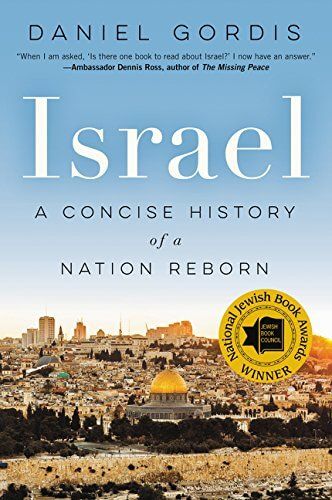 The first comprehensive yet accessible history of the state of Israel from its inception to present day, from Daniel Gordis, “one of the most respected Israel analysts” (The Forward) living and writing in Jerusalem.
The first comprehensive yet accessible history of the state of Israel from its inception to present day, from Daniel Gordis, “one of the most respected Israel analysts” (The Forward) living and writing in Jerusalem.
Israel is a tiny state, and yet it has captured the world’s attention, aroused its imagination, and lately, been the object of its opprobrium. Why does such a small country speak to so many global concerns? More pressingly: Why does Israel make the decisions it does? And what lies in its future?
We cannot answer these questions until we understand Israel’s people and the questions and conflicts, the hopes and desires, that have animated their conversations and actions. Though Israel’s history is rife with conflict, these conflicts do not fully communicate the spirit of Israel and its people: they give short shrift to the dream that gave birth to the state, and to the vision for the Jewish people that was at its core. Guiding us through the milestones of Israeli history, Gordis relays the drama of the Jewish people’s story and the creation of the state. Clear-eyed and erudite, he illustrates how Israel became a cultural, economic and military powerhouse—but also explains where Israel made grave mistakes and traces the long history of Israel’s deepening isolation.
With Israel, public intellectual Daniel Gordis offers us a brief but thorough account of the cultural, economic, and political history of this complex nation, from its beginnings to the present. Accessible, levelheaded, and rigorous, Israel sheds light on the Israel’s past so we can understand its future. The result is a vivid portrait of a people, and a nation, reborn.
2. Israel: A History, Martin Gilbert
 Fleeing persecution in Europe, thousands of Jewish immigrants settled in Palestine after World War II. Renowned historian Martin Gilbert crafts a riveting account of Israel’s turbulent history, from the birth of the Zionist movement under Theodor Herzl to the unexpected declaration of its statehood in 1948, and through the many wars, conflicts, treaties, negotiations, and events that have shaped its past six decades—including the Six Day War, the Intifada, Suez, and the Yom Kippur War. Drawing on a wealth of first-hand source materials, eyewitness accounts, and his own personal and intimate knowledge of the country, Gilbert weaves a complex narrative that’s both gripping and informative, and probes both the ideals and realities of modern statehood.
Fleeing persecution in Europe, thousands of Jewish immigrants settled in Palestine after World War II. Renowned historian Martin Gilbert crafts a riveting account of Israel’s turbulent history, from the birth of the Zionist movement under Theodor Herzl to the unexpected declaration of its statehood in 1948, and through the many wars, conflicts, treaties, negotiations, and events that have shaped its past six decades—including the Six Day War, the Intifada, Suez, and the Yom Kippur War. Drawing on a wealth of first-hand source materials, eyewitness accounts, and his own personal and intimate knowledge of the country, Gilbert weaves a complex narrative that’s both gripping and informative, and probes both the ideals and realities of modern statehood.
“Martin Gilbert has left us in his debt, not only for a superlative history of Israel, but also for a restatement of the classic vision of Zion, in which a Middle East without guns is not a bedtime story but an imperative long overdue. This is the vision for which Yitzhak Rabin gave his life. This book is tribute to his memory.” —Jonathan Sacks, The Times (London)
3. The Israel-Arab Reader: A Documentary History of the Middle East Conflict, Walter Laqueur & Dan Schueftan
 In print for nearly half a century, and now in its eighth edition, The Israel-Arab Reader is an authoritative guide to over a century of conflict in the Middle East. It covers the full spectrum of a violent and checkered history—the origins of Zionism and Arab nationalism, the struggles surrounding Israel’s independence in 1948, the Six-Day War and other wars and hostilities over the decades, and the long diplomatic process and many peace initiatives.
In print for nearly half a century, and now in its eighth edition, The Israel-Arab Reader is an authoritative guide to over a century of conflict in the Middle East. It covers the full spectrum of a violent and checkered history—the origins of Zionism and Arab nationalism, the struggles surrounding Israel’s independence in 1948, the Six-Day War and other wars and hostilities over the decades, and the long diplomatic process and many peace initiatives.
Arranged chronologically and without bias by two veteran historians of the Middle East, this comprehensive reference brings together speeches, letters, articles, and reports involving all the major interests in the area. The eighth edition features a new introduction as well as a large new section—more than 40 pages—recounting developments over the last decade, including the intra-Palestinian factional strife between Fatah and Hamas, the roles played by Egypt and Iran in the region, enduring arguments over a two-state solution and the right of return for Palestinian refugees, and issues of human rights abuse and terrorism.
Related Reading:
4. 1948: A History of the First Arab-Israeli War, Benny Morris
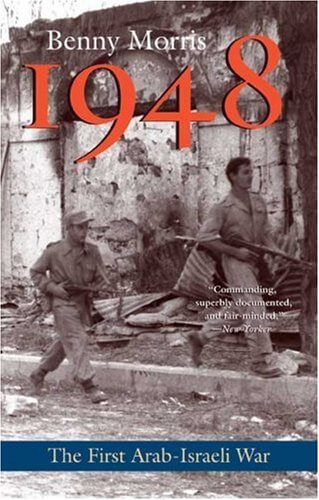 This history of the foundational war in the Arab-Israeli conflict is groundbreaking, objective, and deeply revisionist. A riveting account of the military engagements, it also focuses on the war’s political dimensions. Benny Morris probes the motives and aims of the protagonists on the basis of newly opened Israeli and Western documentation. The Arab side?where the archives are still closed?is illuminated with the help of intelligence and diplomatic materials.
This history of the foundational war in the Arab-Israeli conflict is groundbreaking, objective, and deeply revisionist. A riveting account of the military engagements, it also focuses on the war’s political dimensions. Benny Morris probes the motives and aims of the protagonists on the basis of newly opened Israeli and Western documentation. The Arab side?where the archives are still closed?is illuminated with the help of intelligence and diplomatic materials.
Morris stresses the jihadi character of the two-stage Arab assault on the Jewish community in Palestine. Throughout, he examines the dialectic between the war’s military and political developments and highlights the military impetus in the creation of the refugee problem, which was a by-product of the disintegration of Palestinian Arab society. The book thoroughly investigates the role of the Great Powers?Britain, the United States, and the Soviet Union?in shaping the conflict and its tentative termination in 1949. Morris looks both at high politics and general staff decision-making processes and at the nitty-gritty of combat in the successive battles that resulted in the emergence of the State of Israel and the humiliation of the Arab world, a humiliation that underlies the continued Arab antagonism toward Israel.
5. Six Days of War: June 1967 and the Making of the Modern Middle East, Michael Oren
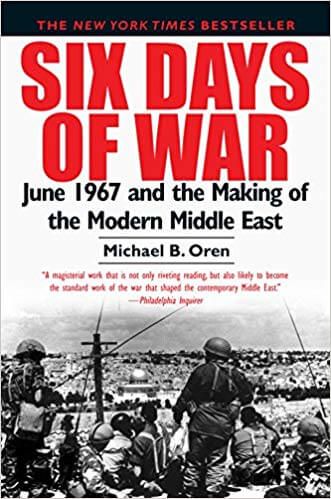 Though it lasted for only six tense days in June, the 1967 Arab-Israeli war never really ended. Every crisis that has ripped through this region in the ensuing decades, from the Yom Kippur War of 1973 to the ongoing intifada, is a direct consequence of those six days of fighting.
Though it lasted for only six tense days in June, the 1967 Arab-Israeli war never really ended. Every crisis that has ripped through this region in the ensuing decades, from the Yom Kippur War of 1973 to the ongoing intifada, is a direct consequence of those six days of fighting.
Writing with a novelist’s command of narrative and a historian’s grasp of fact and motive, Michael B. Oren reconstructs both the lightning-fast action on the battlefields and the political shocks that electrified the world. Extraordinary personalities—Moshe Dayan and Gamal Abdul Nasser, Lyndon Johnson and Alexei Kosygin—rose and toppled from power as a result of this war; borders were redrawn; daring strategies brilliantly succeeded or disastrously failed in a matter of hours. And the balance of power changed—in the Middle East and in the world. A towering work of history and an enthralling human narrative, Six Days of War is the most important book on the Middle East conflict to appear in a generation.
6. The Balfour Declaration: 67 Words: 100 Years of Conflict, Elliot Jager
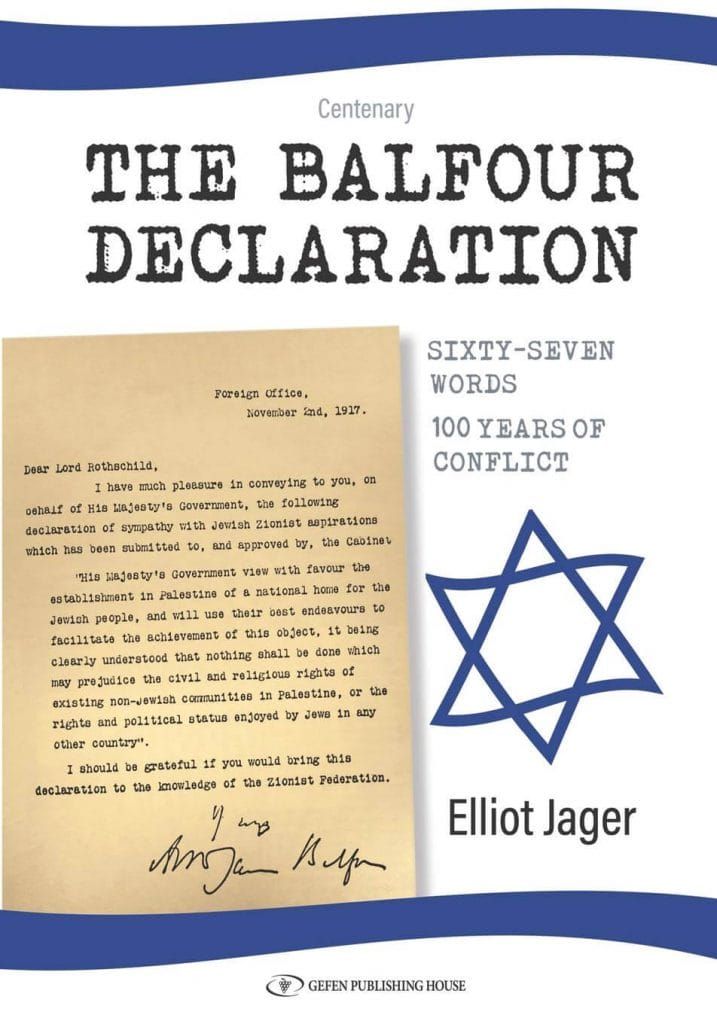 The Balfour Declaration: Sixty-Seven Words 100 Years of Conflict is a concise account of the players, motivations, and setting for one of the most consequential letters of modern history. The letter began a process by which the international community came to embrace the idea of the establishment in Palestine of a national home for the Jewish people. Jager brings to life the extraordinary personalities working amid the global conflict that was World War I. With the war still raging and despite political machinations and numerous secret deals, the Balfour Declaration was issued publicly. Britain promised Palestine to no one but the Jews yet almost immediately, it began backtracking. One hundred years later, amid the Arab world’s unremitting rejection of the very idea of a Jewish homeland, this book spells out the backstory of today’s headlines.
The Balfour Declaration: Sixty-Seven Words 100 Years of Conflict is a concise account of the players, motivations, and setting for one of the most consequential letters of modern history. The letter began a process by which the international community came to embrace the idea of the establishment in Palestine of a national home for the Jewish people. Jager brings to life the extraordinary personalities working amid the global conflict that was World War I. With the war still raging and despite political machinations and numerous secret deals, the Balfour Declaration was issued publicly. Britain promised Palestine to no one but the Jews yet almost immediately, it began backtracking. One hundred years later, amid the Arab world’s unremitting rejection of the very idea of a Jewish homeland, this book spells out the backstory of today’s headlines.
7. The Prime Ministers: An Intimate Narrative of Israeli Leadership, Yehuda Avner
 The Prime Ministers is the first and only insider account of Israeli politics from the founding of the Jewish State to the near-present day. It reveals stunning details of life-and-death decision-making, top-secret military operations and high level peace negotiations. The Prime Ministers brings readers into the orbits of world figures, including Menachem Begin, Yitzhak Rabin, Ronald Reagan, Jimmy Carter, Henry Kissinger, Yasser Arafat, Margaret Thatcher, Princess Diana and the Lubavitcher Rebbe. Written in a captivating literary style by a political adviser, speechwriter and diplomat, The Prime Ministers is an enthralling political memoir, and a precisely crafted prism through which to view current Middle East affairs.
The Prime Ministers is the first and only insider account of Israeli politics from the founding of the Jewish State to the near-present day. It reveals stunning details of life-and-death decision-making, top-secret military operations and high level peace negotiations. The Prime Ministers brings readers into the orbits of world figures, including Menachem Begin, Yitzhak Rabin, Ronald Reagan, Jimmy Carter, Henry Kissinger, Yasser Arafat, Margaret Thatcher, Princess Diana and the Lubavitcher Rebbe. Written in a captivating literary style by a political adviser, speechwriter and diplomat, The Prime Ministers is an enthralling political memoir, and a precisely crafted prism through which to view current Middle East affairs.
The Prime Ministers presents first-hand accounts of major historical events, including: Menachem Begin’s decision to bomb Saddam Hussein’s nuclear reactor; Yitzhak Rabin’s handling of the Entebbe rescue mission; the Egypt-Israel peace process; the shelling of the Irgun arms ship, the Altalena, and Deir Yessin. It offers keen observations of key personalities, and unforgettable descriptions of political rivalries, diplomatic blunders, White House and Buckingham Palace banquets and more, to bring Israel’s history to life in a way no book has done before.
Yehuda Avner served as adviser and English speechwriter to Israeli Prime Ministers Rabin, Begin, Meir and Eshkol. He was a former Israeli Ambassador to Britain, Ireland and Australia, and served in diplomatic positions at the Israeli Consulate in New York and the Israeli Embassy in Washington, DC. Ambassador Avner was born in Manchester, England. He lived in Israel since 1947 until his death in 2015.
8. A History of Zionism: From the French Revolution to the Establishment of the State of Israel, Walter Laqueur
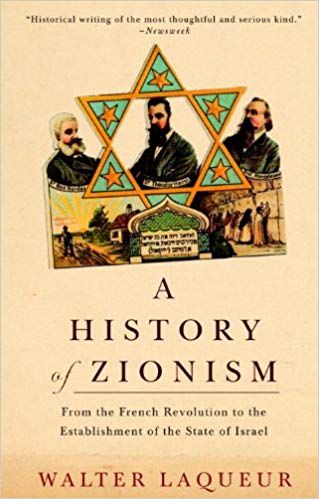 The definitive general history of the Zionist movement, by one of the most distinguished historians of our time.
The definitive general history of the Zionist movement, by one of the most distinguished historians of our time.
Walter Laqueur traces Zionism from its beginnings—with the emancipation of European Jewry from the ghettos in the wake of the French Revolution—to 1948, when the Zionist dream became a reality. He describes the contributions of such notable figures as Benjamin Disraeli, Moses Hess, Baron Edmond de Rothschild, and Sir Herbert Samuel, and he analyzes the seminal achievements of Theodor Herzl, Chaim Weitzmann, and David Ben Gurion.
Laqueur outlines the differences between the various Zionist philosophies of the early twentieth century—socialist, Communist, revisionist, and cultural utopian—and he discusses both the religious and secular Jewish critics of the movement. He concluded with a dramatic account of the cataclysmic events of World War II, the clandestine immigration of Holocaust survivors, the tragic missed opportunities co-existence with both the Arab residents of Palestine and those in the surrounding countries, and the struggle to forge a new state on an ancient land. Laqueur’s new preface analyzes the present-day difficulties, and places them into a fascinating and aluable historical context.
9. The Zionist Ideas: Visions for the Jewish Homeland?Then, Now, Tomorrow, Gil Troy
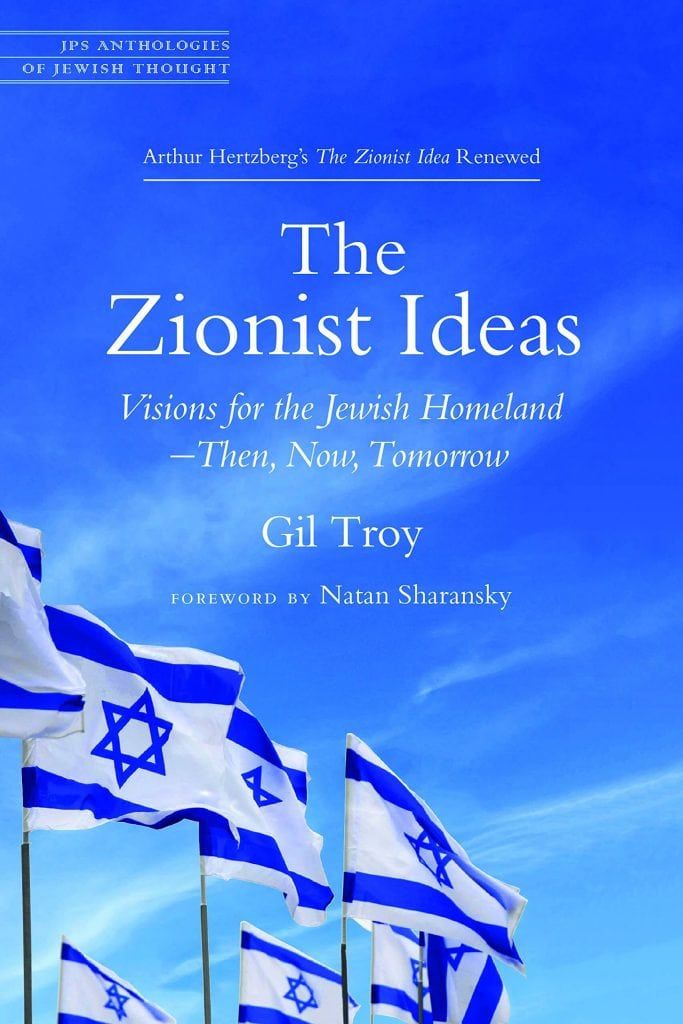 The most comprehensive Zionist collection ever published, The Zionist Ideas: Visions for the Jewish Homeland—Then, Now, Tomorrow sheds light on the surprisingly diverse and shared visions for realizing Israel as a democratic Jewish state. Building on Arthur Hertzberg’s classic, The Zionist Idea, Gil Troy explores the backstories, dreams, and legacies of more than 170 passionate Jewish visionaries—quadruple Hertzberg’s original number, and now including women, mizrachim, and others—from the 1800s to today.
The most comprehensive Zionist collection ever published, The Zionist Ideas: Visions for the Jewish Homeland—Then, Now, Tomorrow sheds light on the surprisingly diverse and shared visions for realizing Israel as a democratic Jewish state. Building on Arthur Hertzberg’s classic, The Zionist Idea, Gil Troy explores the backstories, dreams, and legacies of more than 170 passionate Jewish visionaries—quadruple Hertzberg’s original number, and now including women, mizrachim, and others—from the 1800s to today.
Troy divides the thinkers into six Zionist schools of thought—Political, Revisionist, Labor, Religious, Cultural, and Diaspora Zionism—and reveals the breadth of the debate and surprising syntheses. He also presents the visionaries within three major stages of Zionist development, demonstrating the length and evolution of the conversation. Part 1 (pre-1948) introduces the pioneers who founded the Jewish state, such as Herzl, Gordon, Jabotinsky, Kook, Ha’am, and Szold. Part 2 (1948 to 2000) features builders who actualized and modernized the Zionist blueprints, such as Ben-Gurion, Berlin, Meir, Begin, Soloveitchik, Uris, and Kaplan. Part 3 showcases today’s torchbearers, including Barak, Grossman, Shaked, Lau, Yehoshua, and Sacks.
This mosaic of voices will engage equally diverse readers in reinvigorating the Zionist conversation—weighing and developing the moral, social, and political character of the Jewish state of today and tomorrow.
10. Jerusalem: The Biography, Simon Sebag Montefiore
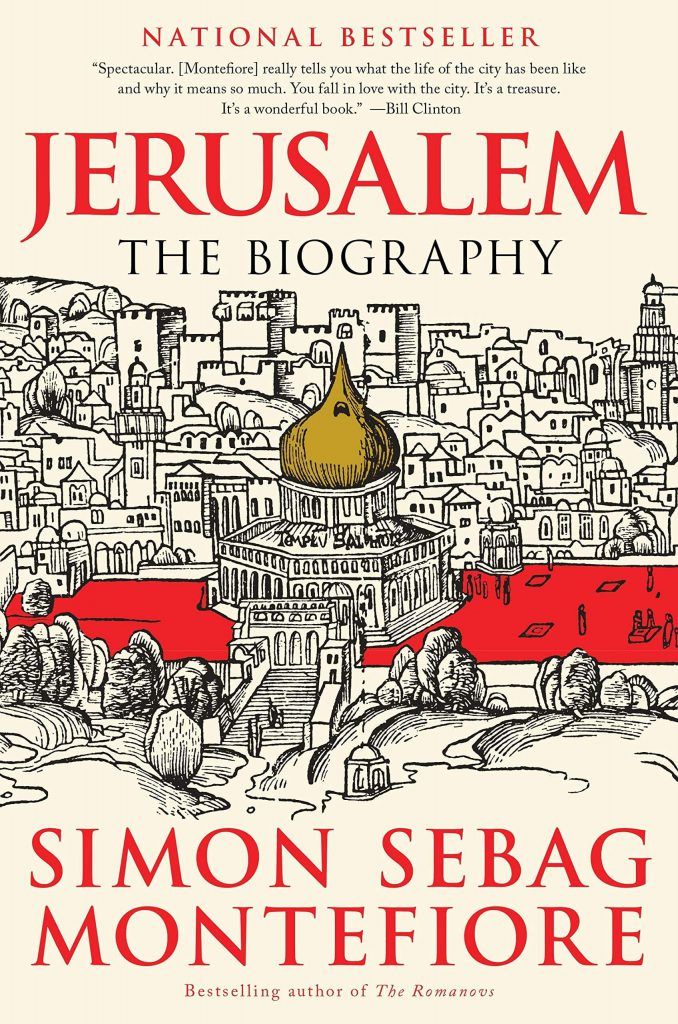 Jerusalem is the epic history of three thousand years of faith, fanaticism, bloodshed, and coexistence, from King David to the 21st century, from the birth of Judaism, Christianity, and Islam to the Israel-Palestine conflict.
Jerusalem is the epic history of three thousand years of faith, fanaticism, bloodshed, and coexistence, from King David to the 21st century, from the birth of Judaism, Christianity, and Islam to the Israel-Palestine conflict.
How did this small, remote town become the Holy City, the “center of the world” and now the key to peace in the Middle East? In a gripping narrative, Simon Sebag Montefiore reveals this ever-changing city in its many incarnations, bringing every epoch and character blazingly to life. Jerusalem’s biography is told through the wars, love affairs, and revelations of the men and women who created, destroyed, chronicled and believed in Jerusalem. As well as the many ordinary Jerusalemites who have left their mark on the city, its cast varies from Solomon, Saladin and Suleiman the Magnificent to Cleopatra, Caligula and Churchill; from Abraham to Jesus and Muhammad; from the ancient world of Jezebel, Nebuchadnezzar, Herod and Nero to the modern times of the Kaiser, Disraeli, Mark Twain, Lincoln, Rasputin, Lawrence of Arabia and Moshe Dayan.
In this masterful narrative, Simon Sebag Montefiore brings the holy city to life and draws on the latest scholarship, his own family history, and a lifetime of study to show that the story of Jerusalem is truly the story of the world.


